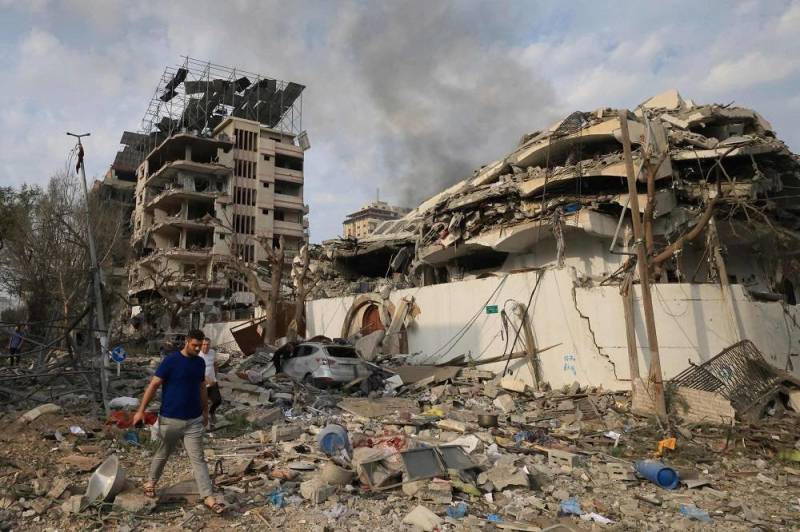
The lethal Hamas attack shattered the aura of Israel’s invincibility. The fearful slaughter of civilians and soldiers shook the country to the core. Israel’s vaunted military is smarting over its failure to detect the surprise Hamas excursion. It is determined to exact mighty vengeance upon Hamas and Gaza in retaliation.
Israel will probably win because of its advanced technology and backing from powerful Western allies. But there is no end to the bloodletting in the endless conflict. It does not spare civilians and non-combatants on both sides — defenseless men, women, and children.
Hamas’s dangerous gambit has been successful. It fed on the genuine anger and despair of the Palestinian people over the Israeli occupation to entrench itself in Gaza. It used its fortified base to launch a well-planned attack on Israel that has had significant consequences.
Israel’s bloody response in Gaza has stirred up the Arab public. It is forcing Arab rulers to step back from their efforts for Arab-Israeli reconciliation. The ongoing conflict has increased the risk of a regional war, bringing attention back to the core Israeli-Palestinian dispute.
More death and destruction from calculated violence await because there is no permanent solution in sight. Hamas must have expected the harsh collective punishment that Israel has imposed on the people of Gaza. In past Israeli-Palestinian flare-ups, Israelis killed a disproportionate number of Palestinians in retaliation.
The fact is that bombings, blockades, and colonization do not bring peace. A renunciation of supremacy, oppression, and violence is the way forward. The fundamental moral principles of equality, freedom, popular sovereignty, and tolerance must apply.
Both sides have lost the ability to see each other as human and are hell-bent on obliterating and pulverizing each other. Israel has become indifferent to the suffering of generations of Palestinians in the territories. It treats the Palestinians as a vanquished people. Despite the long history of Jewish oppression, present-day Israelis are comfortable oppressing Palestinians.
Israel seemed in an enviable position before the Hamas attack. It has had no military challenge since it routed the Arab armies in 1973. It has a robust economy and the unqualified financial and diplomatic support of the United States and its allies.
The disunited Palestinian resistance groups, Fatah and Hamas, were not a significant danger. And pivotal Arab states, once inimical to its existence, were falling in line to establish diplomatic and trade ties with Israel.
Still, Israel pressed ahead with its expansionist policies. It bolstered the permanent occupation of the Palestinians through more settlements and more exclusion. Its hawkish policies remain a serious obstacle to peace and coexistence in a volatile region. Israel has steadily killed the possibility of an economically and politically viable Palestinian state.
Israel’s self-defense policy, both at home and abroad, has come at a moral cost. It believes it is immune to criticism and ignores UN resolutions and International Law. It violates Palestinian rights and inflicts brutal violence on unarmed civilians. Yet, few Israelis question or criticize the policies of their government.
Palestinians continue to resist because they refuse to accept death or enslavement. It is a response to Israel’s brutal occupation and disproportionate use of force. Despite being painted as fiercely fanatical, the Palestinians struggle. They have learned to contend with the unfavorable international narrative of their long struggle.
Israel’s self-defense policy, both at home and abroad, has come at a moral cost. It believes it is immune to criticism and ignores UN resolutions and International Law.
Jews should understand the choices before the Palestinians from their history. Many Jews were sent to their deaths in Hitler’s death camps, while others resisted the Nazis. The Warsaw Ghetto uprising in 1943 is part of Jewish history. A small but determined band of Jewish fighters held off thousands of German soldiers and police to the death. The Palestinian resistance is doing much the same.
Meanwhile, the cycle of violence continues without end while the world stays silent. The adversaries demonize and wear down the other, thinking that time is on their side. Jockeying for short-term advantage damages the longer-term prospects for a permanent solution. Extremists on both sides revel in the toxic atmosphere.
The fact is that bombings, blockades, and colonization do not bring peace. A renunciation of supremacy, oppression, and violence is the way forward. The fundamental moral principles of equality, freedom, popular sovereignty, and tolerance must apply. It is the only way to change the tragic history of the region.
Israel and its international backers must know that the only realistic chance for peace is an independent Palestinian state. Hubris and denial will not change the harsh ground realities. Israelis should not construe working for peace as a sign of weakness. Both sides have to find the elusive peace and security they sorely need to live in freedom and safety.
The first step is a ceasefire in Gaza and immediate cessation of hostilities. A framework towards coexistence, such as the revival of the 1993 Oslo Accord that envisioned a two-state solution, must follow. Implementation of the Accords provides the best chance to end hostilities and find a just and lasting peace. Otherwise, the future outlook for the region and its people is gloomy.

